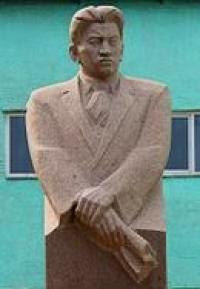You are here
Monument of Zhurgenev in Almaty.

Kazakhstan tours.
“Only through light do we see beauty !!!”
A.N. Abramov.
A trip from Zyryanovsk to Almaty.
Monument to party and statesman Temirbek Zhurgenev located in front of the building of the Kazakh National Academy of Arts named after T.K. Zhurgenev. Opened December 6, 2001. Sculptor - E. A. Sergebaev.
Temirbek Zhurgenev (1898 - 1939) is a native of Aktobe region. A participant in the struggle for the establishment and consolidation of Soviet power in Turkestan and Kazakhstan, a Soviet party, statesman. Zhurgenev graduated from the Russian-Kazakh elementary school (1913), the Russian-Kazakh school named after Sukhansky in Perovsk (1917).
In 1917 he entered the Ufa land surveying school, but the civil war interrupted classes and involved T. Zhurgenev in the whirlpool of political struggle: he takes part in the preparation of the regional congress of Soviets, works in the Kazakh newspaper, fights against workers of the Irgiz district against the White Guards.
Chairman of the Kenzhegarin Volost Revolutionary Committee, in 1920 - 1921 - Deputy chairman and chairman of the Irgiz district executive committee. The transition to peaceful construction allowed Zhurgenev to continue his studies.
After graduating from the Orenburg Workers' Faculty (1923), he receives a referral to the Central Asian State University (1927). During the recovery period, the country was in dire need of specialists and organizers of the national economy, therefore, it was often practiced to attract university students and technical schools to work in various institutions.
In 1924 - 1926 student Zhurgenev was instructed to act as plenipotentiary representative of the KASSR in the Turkestan Republic. As an envoy, he took an active part in preparing the national-state demarcation of Central Asia and Kazakhstan, collected extensive statistical and demographic material, studied literature and archival sources. In the final year of the university, Zhurgenev was appointed rector of the Kazakh Pedagogical Institute in Tashkent (1926 - 1929). He was elected a member of the CEC of Kazakhstan and Turkestan.
Having graduated with honors from the university, Zhurgenev was left as a research assistant in state law. But in 1929 he was appointed People's Commissar of Finance of the Tajik SSR, in 1930 - 1933. headed by the People's Commissariat of the Uzbek SSR.
The appointment in 1933 of T. Zhurgenev as the People's Commissar of Education of the Kazakh Autonomous Soviet Socialist Republic took place in a very difficult time for the republic. The new leadership of the Kazkraykom of the CPSU (b) made great efforts to correct the gross political mistakes made during the period of collectivization, which had tragic consequences for the local population.
any problems have accumulated in the field of public education. Zhurgenev's organizational talent was revealed during the implementation of universal primary education, the development of educational institutions and universities of the republic. To study cases in public education, he makes numerous trips to various areas, makes reports and articles.
The people's commissar’s activity in the development of literature and art of Kazakhstan was extremely fruitful. He made a great contribution to the development of the Kazakh literary language, to the creation of scientific terminology, enrichment of the theory and practice of translation.
Zhurgenev tirelessly sought out folk talents, created the necessary conditions for them to study and work. He did a lot for the creative growth of the collective of the Kazakh Musical Theater. Zhurgenev contributed to the development of the Kazakh national opera, cinema, and Kazakh drama.
He devoted much energy and energy to preparing and conducting in May 1936 the Decade of Literature and Art of Kazakhstan in Moscow, following which he was awarded the Order of the Red Banner of Labor. From 1933 to 1937 Zhurgenev is a member of the district committee of the CPSU (b) of Kazakhstan and its bureau.
He is one of the first translators of the works of the classics of Marxism-Leninism into the Kazakh language. A talented leader of the cultural revolution, Zhurgenev was in the prime of his creative powers when, in August 1937, he was unjustifiably arrested and died tragically.
Authority:
https://infourok.ru/otey-batir-istoriya-kazahstana-2986341.html







